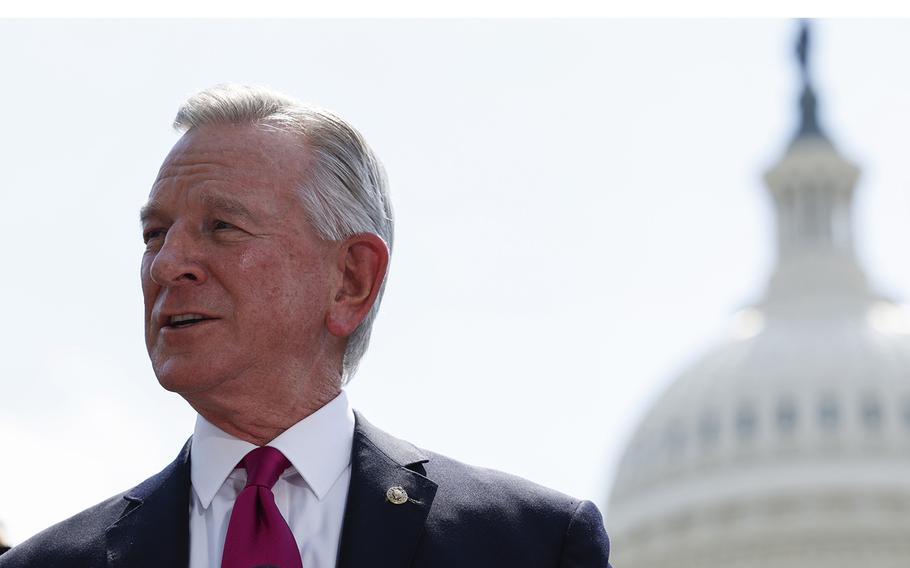
Sen. Tommy Tuberville, R-Ala., speaks at a press conference outside the U.S. Capitol Building on April 27, 2023, in Washington, D.C. (Anna Moneymaker/Getty Images/TNS)
WASHINGTON (Tribune News Service) — Senate Republicans who favor a strong U.S. military have begun to directly challenge party populists over national security, raising the odds for more Ukraine aid and an end to a monthslong blockade on Pentagon promotions.
The so-called defense hawks, once the power center of a party that has grown increasingly isolationist, have become more assertive amid a war in the Middle East, rising tensions between China and its neighbors and a struggle over whether to continue assistance to Ukraine in its defense against Russia’s invasion.
But it was the pileup of military nominations, engineered by Republican Sen. Tommy Tuberville of Alabama to protest Defense Department abortion policies, that put the growing acrimony on full display this week.
Several Republican senators led by Joni Ernst of Iowa and Dan Sullivan of Alaska lambasted Tuberville’s blockade for increasing risks to U.S. forces around the world. They cited conflict in the Middle East and Europe and threats in Asia.
Sullivan called the blockade “a national security suicide mission,” and said the Chinese leader Xi Jinping and Russian President Vladimir Putin were loving it.
“How dumb can we be?” he asked, pointing out that hundreds of officers are caught in limbo instead of doing the jobs they were trained and promoted for, commanding the American armed forces.
Many of the nominated generals and admirals whose Senate confirmations have been stymied, Sullivan warned, will soon choose to quit and join the private sector, where they can make more money.
U.S. Marine Corps Commandant Eric Smith was hospitalized after an apparent heart attack last Sunday, highlighting stress on senior officers as he led the service branch without a confirmed assistant commandant.
Senate Republicans plan to hold a special meeting to discuss the issue this coming week. Sen. Chris Van Hollen, a Maryland Democrat, said in an interview on Bloomberg Television’s “Balance of Power” that the two GOP senators’ comments are “a good sign that maybe we’re heading in the right direction” to end the blockade.
Still, most Republicans want to avoid voting on a resolution to bypass Tuberville, which Senate Majority Leader Chuck Schumer said he plans to bring to the Senate floor. That resolution, which would bundle the nominations to shorten the time for processing them, would require 60 votes, but set a precedent eroding the power of every individual senator to gum up the works to get the attention of the administration.
“Vote what you think your constituents would want you to vote,” said Tuberville, who argues that he is representing voters who oppose abortion, also a priority for many party activists who play a critical role in Republican primaries.
Tuberville objects to U.S. military travel and leave policies adopted after the Supreme Court overturned the Roe v. Wade constitutional right to an abortion. The policies allow service members and their families to go to states where the procedure is legal.
Clash over Ukraine
There’s a parallel fight over funding Ukraine, with Republican leader Mitch McConnell joining the party’s hawks to urge the Senate daily to back more Ukraine aid as part of a broad national security emergency package. President Joe Biden has sought $106 billion to assist Ukraine, Israel, Taiwan and U.S. border enforcement.
“I see that as essential,” Sen. Mitt Romney, a Utah Republican, said Thursday of Ukraine assistance. “If we walk away from Ukraine, then the Europeans are going to say ‘why do we count on you?”
A smaller group of populists like JD Vance of Ohio and Josh Hawley of Missouri oppose aid to Ukraine outright, and some Republican senators in the middle insist on border security changes as the price of moving on Ukraine.
Defense hawks in the House are also stirring, though there party leaders play a more decisive role in setting the agenda.
Republican lawmakers who focus on national security strength played a key role in ending hard-line conservative Jim Jordan’s speaker candidacy over his past calls for deep budget cuts. They only fell in line behind the new speaker, Mike Johnson, after discussions over his approach to Ukraine and full-year defense funding.
Influential GOP lawmakers such as Foreign Affairs Committee Chairman Michael McCaul of Texas, a self-described hawk, say they continue to press the new speaker on Ukraine assistance.
Johnson was one of only 57 House members to vote against the $40 billion opening tranche of Ukraine war aid in May 2022. He also pried apart Biden’s emergency national security funding request so that the House last week could separately handle Israel aid, which is more popular with the Republican populist wing.
But Johnson assured Senate Republicans in a private meeting this week that he considered Ukraine assistance a priority, lawmakers said.
The new speaker told reporters Thursday that the House would move to funding Ukraine next, though with provisions tying it to Republican demands on border security.
McConnell has also said the key to unlocking a broad national security package including Ukraine is getting a strong border package. Democrat Chris Murphy of Connecticut and Arizona independent Kyrsten Sinema are working with Republicans to try and hammer out a deal, with Sen. James Lankford of Oklahoma saying changes to asylum rules and other policies attracting foreigners to come to the border are the crucial issue for the GOP.
“This is a high-wire act with real-world consequences,” Murphy said. “This is a potential path, but it’s a pretty difficult road.”
With assistance from Erik Wasson, Roxana Tiron, Mackenzie Hawkins, Annmarie Hordern, Joe Mathieu and Billy House.)
©2023 Bloomberg L.P.
Visit bloomberg.com
Distributed by Tribune Content Agency, LLC.